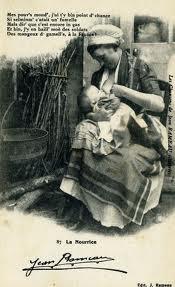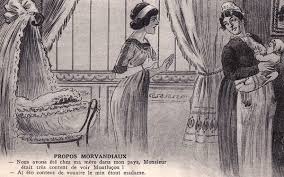Paris Downstairs: Breasts for hire
From Victorian Paris: https://victorianparis.wordpress.com/2014/01/26/paris-downstairs-breasts-for-hire/
This excerpt from Octave Uzanne’s The Modern Parisienne was written in 1912, but it captures the attitude towards servants and women in general of the period that we are studying.
The greater part of the servants in Paris, as we have said, come from the provinces. They are almost entirely drawn from the  peasant class, but let no one imagine that for this reason they are humble and devoted to their masters. The devoted servant adoring the children, sharing the sorrows of the family, offering her little savings in case of need, in short, the female Caleb, has no existence except in romances. These melodramatic creatures, who brought tears to the eyes of our grandmothers are not of our day. At the time of the revolution, servants were still content to be considered dependents. Today [1912] they regard themselves as office-holders; they have their union and have instituted at the Sale Wagram a ball named the Gens de Maison [The House People].
peasant class, but let no one imagine that for this reason they are humble and devoted to their masters. The devoted servant adoring the children, sharing the sorrows of the family, offering her little savings in case of need, in short, the female Caleb, has no existence except in romances. These melodramatic creatures, who brought tears to the eyes of our grandmothers are not of our day. At the time of the revolution, servants were still content to be considered dependents. Today [1912] they regard themselves as office-holders; they have their union and have instituted at the Sale Wagram a ball named the Gens de Maison [The House People].
Their object in coming to Paris is to make money, save it, and buy a small property in their native country. With this end in view they hoard rigidly, in a hard narrow spirit, with no consideration except for the future. Formerly they tried their hands at lotteries, today they invest in savings bank with assuredly more chance of success.
This [female] servant class has a hierarchy of many degrees. The nursery governess is at the top of the list, then the lady’s maid struggles for the second place with the high-class cook; lower in the scale is the children’s nurse, the general servant, and the femme de ménage (the chairwoman). There is also a privileged personage, flattered, despised, and envied by the other sycophants – the person who sells her sturdy child’s milk to the bourgeoise’s weakly infant; I mean the wet-nurse.
The nourrice (wet nurse) is merely a kind of milch cow, always stout and fresh looking. She comes from the country, often after a lapse of virtue, and is engaged haphazard from a registry office by bourgeoises who cannot or will not nurse their own children. She is extraordinarily passive and feeds the infant mechanically. It hardly interests her and she would leave it to cry or neglect to wash it unless supervised. Of a very rudimentary intelligence, she only demands plenty of good food and drink. But as she is dominated by sensuality, she cannot keep away from men, and would very quickly fall again if great care were not taken.
 I knew of a nourrice who was married, and whose husband served his time in a regiment in Paris. He came to see his wife whenever possible, and it was almost absurd to see the constant supervision by the mistress of the house. The two unfortunate creatures could only look at each other. They dared not even kiss, for Madame was always there, like a gendarme, to keep their virtue intact.
I knew of a nourrice who was married, and whose husband served his time in a regiment in Paris. He came to see his wife whenever possible, and it was almost absurd to see the constant supervision by the mistress of the house. The two unfortunate creatures could only look at each other. They dared not even kiss, for Madame was always there, like a gendarme, to keep their virtue intact.
When the infant is weaned, the nurse sometimes stays with the family as the children’s nurse. But, as she dislikes Paris, she more often returns to the country where her former misadventure is repeated. Her business in life is, in truth, the only one she is fitted for. Idle, greedy, enervated by her relatively luxurious life in Paris, she is unfitted for work in the fields. The other servants despise her. Their self-respect makes them contemptuous of a woman who sells her life in that fashion. But they are jealous of her, because she does nothing and is well-fed. The nourrice receives from 80 to 120 francs a month(*). Beside her wages, she is dressed by Madame in a striking and expensive costume. Her caps with the enormous ribbon trimmings often cost as much as her mistress’ hats.
(*) Up to four times the maid-of-all-work’s wages